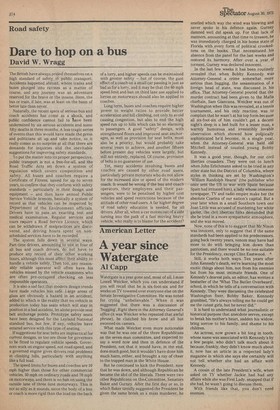American Letter
A year since Watergate
Al Capp
Watergate is a year gone and, most of all, I miss Lowell Weicker, which you can understand if you will recall that he is six-foot-six and for weeks on TV towered over everyone else on the Senate Investigative Committee. He was noted for crying "unbelievable." When it was suggested that there was a discussion of 'bugging', Right there in the Attorney General's office (it was Weicker who repeated that awful phrase), he clutched his brow and all but swooned on camera.
What made Weicker even more noticeable was that he was one of the three Republicans on the seven-man committee, and expected to say a word now and then in defence of the President, not that it would have, in the end, done much good, but it wouldn't have done him much harm, either, and brought a ray of cheer to the trapped man in the White House.
But he continued to kick the President, now that he was down, and although Republican he became the idol of the liberals. There were two other Republicans on the.Committee, Senators Baker and Gurney. After the first day or so, in which Baker timidly suggested the President be given the same break as a mass murderer, he
smelled which way the wind was blowing and never spoke in his defence again. Gurney damned well did speak up. For that lack of manners, amounting at that time to treason, he was immediately charged in his home state of Florida with every form of political crookedness on the books. That necessitated his absence from the panel for the last weeks and restored its harmony. After over a year of torment. Gurney was declared innocent.
In the last few weeks it has been routinely revealed that when Bobby Kennedy was Attorney-General a crime somewhat more serious than bugging, the assassination of a foreign head of state, was discussed in his office. That Attorney-General pouted that the murder contract had been given to the Mafia chieftain, Sam Giancana. Weicker was out of Washington when this was revealed, at a tennis tournament, and his only reaction was to complain that he wasn't at his top forth because all six-foot-six of him couldn't get a decent night's sleep in a bed built for a lesser man, a warmly humorous and irresistibly lovable observation which showed how polttically sophisticated he'd become, in a single year, when the Attorney-General was bald old Mitchell instead of tousled young Bobby Kennedy.
It was a good year, though, for our civil liberties crusaders. They were out to lunch when John Erlichmann asked to be tried in any other state but the District of Columbia, where styles in thinking are set by Washington's 'William Randolph Hearst' (the publisher who once sent the US to war with Spain because Spain had irritated him), a lady whose immense newspaper, TV and radio empire make her the absolute Czarina of our nation's capital. But a year later when in a small Southern town one Joan Little was accused of murdering her white gaoler, the civil liberties folks demanded that she be tried in a more sympathetic atmosphere, and she was moved.
Now, none of this is to suggest that Mr Nixon was innocent, only to suggest that if the same standards had been applied to his predecessors, going back twenty years, venom may have had more to do with bringing him down than patriotism, and there would be no one suitable for the Presidency, except Clint Eastwood.
Still, it works both ways. Ten years after John Kennedy's death, we're learning the most exotic things about him, not from his enemies but from his most intimate friends. One of Kennedy's dearest pals, an editor, has written a bestseller of the 'What The Butler Overheard', school, in which he tells of a conversation with Kennedy. They were discussing the celebrated Washington fixer, Bobby Baker. Kennedy grumbled, "He's always telling me he could get me the cutest girls, but he never did."
It is hard to understand what journalistic or historical purpose that anecdote serves, except to break his mother's heart, sadden his widow, bring sorrow to his family, and shame to his children.
An actress, now grown a bit long in tooth, whose name was associated with Kennedy's by a few people, who didn't talk much about it because, frankly, they didn't know much about it, now has an article in a respected lady's magazine in which she says she certainly will not tell whether she had an affair with Kennedy.
A cousin of the late President's wife, when asked on TV whether Jackie had had any affairs while she was First Lady, snapped that if she had, he wasn't going to discuss them.
With friends like that, you don't need enemies.


































 Previous page
Previous page